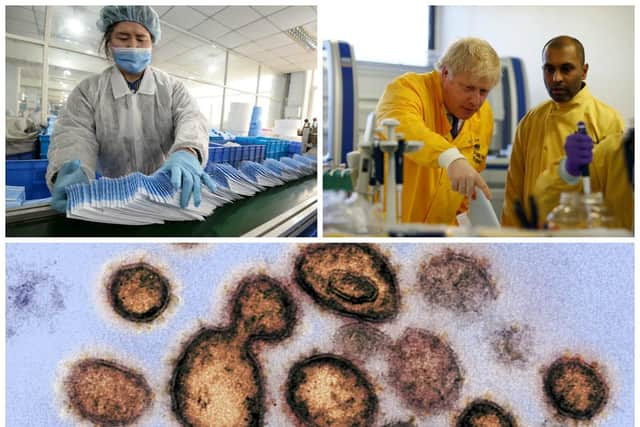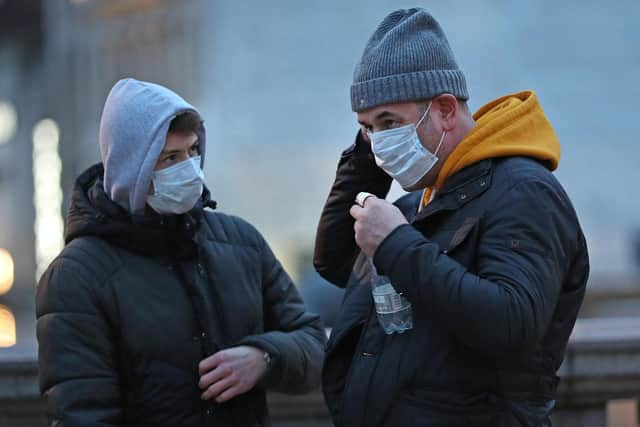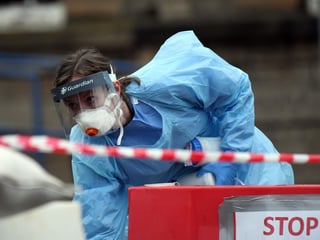Coronavirus in Scotland: What is the COVID-19 virus, what are the symptoms and what is the advice from the Scottish Government?
A Tayside resident who recently travelled from Italy has become the first person in Scotland to be diagnosed with coronavirus, the Scottish Government said on Sunday night.
Coronavirus in Scotland


The person, who has not been named, has been admitted to hospital and is currently receiving treatment in isolation.
Advertisement
Hide AdAdvertisement
Hide AdFirst Minister Nicola Sturgeon said: "Our first thoughts must be with the patient diagnosed with coronavirus, I wish them a speedy recovery."
Scotland's Chief Medical Officer Dr Catherine Calderwood said: "Firstly our thoughts are with the person who has been diagnosed, and with their family.
"I would like to thank all the health professionals who continue to be involved in their care and treatment."


How prepared is Scotland?
The Government statement said clinicians had begun tracing the person's contacts and gathering details of the places they have visited and the people they have been in contact with since returning to the UK.
Close contact involved face to face contact or spending more than 15 minutes within two metres of an infected person, rather than simply passing in a street or a shop, the statement said.
Ms Sturgeon added: "Scotland is well-prepared for a significant outbreak of coronavirus but there is currently no treatment or vaccine. Early detection measures will continue to be vital in helping to prevent the spread of the virus.
"People have a vital role to play in helping us contain any outbreak by following the latest health and travel advice, and following basic hygiene precautions, such as washing hands frequently, not touching their face and covering their nose and mouth with a tissue when coughing or sneezing."
What is Coronavirus?
A coronavirus is a type of virus. Typical symptoms include fever, a cough that may progress to a severe pneumonia causing shortness of breath and breathing difficulties.
Advertisement
Hide AdAdvertisement
Hide AdGenerally, coronavirus can cause more severe symptoms in people with weakened immune symptoms, older people, and those with long term conditions like diabetes, cancer and chronic lung disease.
Because it's a new illness, we do not know exactly how coronavirus spreads from person to person, but similar viruses are spread by droplets in coughs and sneezes.
What are the symptoms of coronavirus?
According to the NHS The symptoms of coronavirus are: a cough, a high temperature and shortness of breath
However, these symptoms do not necessarily mean you have the illness.
The symptoms are similar to other illnesses that are much more common, such as cold and flu.
Can people with no symptoms spread the virus?
The jury is still out on this one, although scientists believe there is evidence of asymptomatic transmission.
The UK’s Department of Health has said it believes the risk of catching coronavirus from someone with no symptoms at all is low.
But because many people with Covid-19 experience only mild symptoms, particularly during the early stages of the disease, it is possible to catch it from someone who has mild symptoms.
Government advice
Advertisement
Hide AdAdvertisement
Hide AdThe Scottish Government has stressed the risk of infection remains low for the population at large.
According to Scottish and UK protocol all patients presenting with a history and symptoms which may be suggestive of coronavirus will be isolated and appropriate infection prevention and control measures put in place. Ministers in Scotland are guided by international advice issued from the World Health Organisation as well as the NHS.
The NHS has identified several areas around the world where people are at higher risk of getting the virus. These areas are outlined in detail on the NHS Inform website here.
The UK Government said people returning from Hubei province in China, Iran, locked-down areas in northern Italy and special care zones in South Korea in the last 14 days should immediately self-isolate at home and call NHS 111.
People returning from a number of other countries including the rest of China and Korea, Japan, Hong Kong and Singapore should self-isolate if they develop symptoms of cough or fever or shortness of breath.It also said those returning from Vietnam, Cambodia, Laos, Burma and northern Italy above Pisa should self-isolate if they show symptoms.
If you do not have symptoms and are looking for general information on the disease, a free NHS helpline has been set up on: 0800 028 2816. The helpline is open 8.00am to 10.00pm Monday to Friday, and 9.00am to 5.00pm on the weekend.
How to avoid catching infections like coronavirus
You can reduce your risk of getting and spreading respiratory infections by:
- avoiding direct hand contact with your eyes, nose and mouth
Advertisement
Hide AdAdvertisement
Hide Ad- maintaining good hand hygiene - washing hands with soap and water or alcohol hand sanitiser:
- after coughing or sneezing
- after going to the toilet
- before eating and drinking
- avoiding direct contact with people that have a respiratory illness and avoiding using their personal items such as their mobile phone
- covering your nose and mouth when coughing or sneezing with disposable tissues and disposing of them in the nearest waste bin after use
What is the scale of the problem?
So far, China has reported nearly 80,000 cases and almost 3,000 deaths.
Outside China, there have been cases in nearly 60 countries with around 100 deaths.
The first Briton to die from the virus had been on board the Diamond Princess cruise ship which was quarantined off the coast of Japan.
He was the sixth passenger from the ship to die after more than 700 tourists contracted coronavirus on board.
What's happening in the UK?
There have been 36 confirmed cases in the UK, with more than 10,000 people having been tested.
Advertisement
Hide AdAdvertisement
Hide AdThere have been 33 cases diagnosed in England, one in Northern Ireland, one in Wales and one in Scotland.
The 20th case was the first transmission of coronavirus within the UK and the Department of Health and Social Care said the original source was "unclear".
Eight of the confirmed UK cases have been discharged from hospital. There have been no deaths.
The first diagnosed case in the Irish Republic was reported on Saturday.
Comments
Want to join the conversation? Please or to comment on this article.
